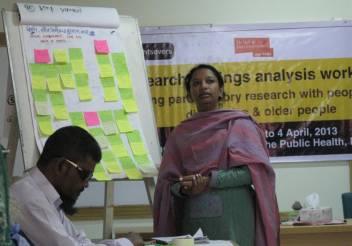 As part of HelpAge’s engagement with the post-2015 process, they have linked up with SightSavers, Action on Disability and Development (ADD), the Institute of Development Studies in the UK and a wider group of organisations working on disability and mental health.
As part of HelpAge’s engagement with the post-2015 process, they have linked up with SightSavers, Action on Disability and Development (ADD), the Institute of Development Studies in the UK and a wider group of organisations working on disability and mental health.
The aim is to explore the potential of gathering evidence and conducting participatory research with people currently excluded from the Millennium Development Goals (MDG).
The group is called “Voices of the Marginalised”. I was invited to take part in this project as a peer researcher as I work with the Resource Integration Centre (RIC), a HelpAge Affiliate.
The project will inform the development programmes and framework that will follow the MDGs when they expire in 2015. The research was done by two groups; peer researchers, who work with older people and people with disabilities, and action researchers from the community.
Proud to be part of the project
I feel very proud to be a part of this project because the result of this research will play an important role in the post-2015 process, which will be ultimately related to helping the poorest people in our society.
I work with older people in three districts in Bangladesh and was tasked with interviewing my colleagues who work with older people directly. So far I have collected 14 stories, which have all given me a new perspective on the issues older people face regarding livelihoods, health and active ageing. The project also gathered information from older people on what they think of development.
Older people and people living with disabilities
During our analysis workshop, which took place at the beginning of April, I had the chance to find out more about another marginalised groups, people living with disabilities, and their views of development.
We looked at the consequences of being marginalised and, in groups, analysed and discussed the most complex problems that had come out of the stories that have been collected.
Recommendations
Reflecting on the workshop, we realised that to make the project sustainable, the community, older people and people with disabilities should be more involved. When talking to older people, their priority issues were food, health, shelter and education.
The most interesting thing was that though there were some differences in issues between the action researchers’ analysis and peer researchers’ analysis, at the end of the day everybody gave their consent to the analysis and what should be done to overcome the situation for older people and people with disabilities.
Find out more about our work on the post-2015 process.
